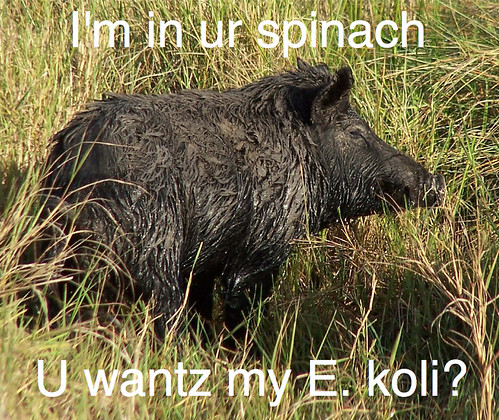
With all of the stories about bacterial contamination of food, a recent paper describes one possible way to reduce the virulence--the ability to cause disease--of the bacterium Escherichia coli.
Farms are an obvious...input of E. coli--the amount of feces that a single pig produces is staggering, never mind a thousand pigs*. The concern is that E. coli from agricultural settings can either serve as a genetic reservoir of virulence (disease-causing) genes (and antibiotic resistance genes too), or as a source of virulent E. coli strains, such as E. coli O157:H7.
What the authors of paper observed is that when pig manure is stored, the frequency of virulence genes found in E. coli decreases. Interestingly, this decrease stems from a decrease in virulent strains and a loss of virulence genes in one common genotype. The authors also incubated E. coli in sterilized manure, and found that the strains without virulence genes dominated after seven weeks.
Mind you, this isn't very glamorous, but it could play a big role in cleaning up our food supply.
*Finding rigorous figures is difficult, but, as far as I can tell, pound for pound, pigs produce a lot more shit than other farm animals. While there's been some talk about how pork production is better for the environment, all of that shit has to go somewhere.
- Log in to post comments

Err....Mike - domesticated pig poo IS stored. As your photo shows, the problem in most places, like California spinach farms, is wild pigs that are free to wander with very limited predation, human or animal. How about a nice fair-use shot of Porky Pig (TM, C, etc. somebody) instead?
How was the manure sterilized?
Joe,
I know. I just like the picture.
Ian,
autoclaving.